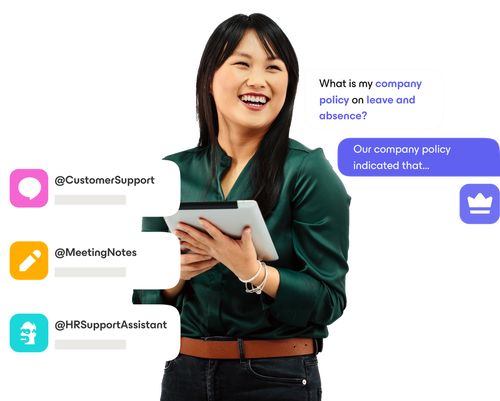The Future of Work with AI Agent Assist: Insights from Artefact
.jpeg?width=1000&height=667&name=The%20Future%20of%20work%20with%20AI%20Agents%20(1).jpeg)
Introduction
Artificial Intelligence (AI) is a real force changing how people work in many industries. A detailed survey by Artefact in France included over 2,000 employees and 30 business leaders. It shows how Generative AI agents are changing workforce structures, productivity, and organizational dynamics.
According to the survey, 84% of users find their work more pleasant, and 83% find it simpler when using Generative AI. Moreover, 83% report using AI at least once a week. With such a high level of satisfaction and frequency, individual use of Generative AI is becoming an unstoppable trend.
Let’s explore how employees feel about the adoption of Generative AI agents in the workplace, how it is reshaping job roles, and what trends are likely to define the near future of work.
An Overview of AI Agents
AI Agents use AI to solve problems in autonomy. They can plan their actions and explore their environment. They use "tools" to find solutions, complete tasks, or meet goals. They can also make decisions and trigger actions in autonomy, automating human work.
Learn more about AI Agents and its features.
The Rise of the AI Agents in Workplace

As enterprises across France explore the potential of Generative AI, many are reaching a critical threshold: how to scale beyond individual productivity gains toward structured, organization-wide transformation. For companies seeking sustainable operational efficiency, this evolution increasingly centres around one paradigm — the rise of AI agents.
Unlike AI assistants, which provide users with suggestions or summaries, AI agents can execute tasks, interact with enterprise systems, and adapt within predefined workflows. They are not simply augmenting human cognition; they can carry out well-scoped processes, often with full or semi-autonomy. As noted in the report:
“AI agents are designed to solve well-scoped problems in autonomy and speed up work execution.”
Currently, 12% of French employees are using AI tools regularly in their work. These users are not limited to data scientists or software engineers. In many cases, they include HR specialists, marketers, junior staff members, and team leads.
Among these early adopters:
- 92% report satisfaction with AI in their work.
- 83% say their jobs have become simpler.
- 84% believe AI helps them deliver higher-quality or more creative outputs.
And the most measurable benefit? Users are saving an average of 57 minutes per day. That equates to nearly five hours a week — almost a full extra workday every month.
Among the top 4% of users, daily time savings exceed three hours. In total, 58% of users rely on AI specifically to gain time.
Why Are Employees Using AI Agents?
One of the primary reasons for adopting Generative AI is its ability to enhance both productivity and the quality of output.
Based on Artefact’s interviews with AI leaders, the most impactful use cases often involve enabling users to complete tasks they previously couldn’t manage. According to the survey, 25% of AI users at work reported that AI allowed them to accomplish tasks they were not previously capable of performing. Their main motivation for using AI is to work more efficiently and effectively.
When asked why they use AI, many users provided examples of how it expanded their abilities. One such case involved an HR professional who, with AI assistance, learned to write VBA macros and began automating tasks in Excel.
Individual AI adoption tends to depend more on how well the technology supports specific tasks rather than the industry in which a person works. While overall AI usage among employees averages 12%, some groups exhibit significantly higher adoption rates:
- 41% in IT and tech, where tools like GitHub Copilot are common
- 29% of workers aged 18–24 and 20% of those aged 25–34, whose simpler tasks benefit more from AI support
- 22% of managers, who use AI to summarize meetings, gather insights, and develop plans
- 18% of sales professionals, who benefit from AI-generated meeting summaries and automated CRM updates, saving time and improving data quality
According to the study:
- 56% of users take on more tasks with the time saved
- 33% spend more time collaborating with colleagues
- 25% use the time for learning and training
All interviewed companies reported slow but consistent productivity gains from AI use, although these are often absorbed by increased workload or business growth.
AI Satisfaction distribution by Enterprise Department:

Transforming Roles, Not Replacing Them
Rather than replacing employees, AI agents are reshaping how work is structured. The report highlights that agentic automation tends not to reduce headcount but rather expands operational capacity.
For example:
- Support teams can process more tickets without increasing staff.
- HR departments can automate onboarding and training-related queries.
- Service desks can triage and resolve low-complexity issues instantly.
The study shows that AI adoption is creating more jobs than it displaces. Survey results indicate that employees in companies investing in proprietary AI experience nearly four times the productivity and work benefits compared to those in organizations that do not.
- 50% of respondents reported observing more job creation than job reduction (compared to 12% who noticed the opposite; the rest saw no change).
- 54% stated that their department had benefited from measurable productivity gains.
The World Economic Forum anticipates a +22% annual job growth linked to AI. Meanwhile, France’s tech workforce is projected to see a 110% increase in Big Data-related jobs over the next five years.
Furthermore, 80% of AI users who reported high productivity gains said their company had invested in resources such as computing power, data platforms, or proprietary AI system
Case Studies: How Leading Companies Are Using AI to Transform Work
- Ardian – Financial Document Automation

Ardian, a private investment house, implemented an AI agent to analyze large volumes of financial documents. This freed up analysts from routine tasks and enabled them to focus on high-value activities such as strategic decision-making. The AI system classifies and synthesizes insights from reports, allowing for faster, more accurate financial assessments.
- Legrand – Augmenting Customer Support

Legrand, a global electrical and digital infrastructure company, introduced AI assistants in customer support to automatically generate responses and documentation. Agents assist support staff by preparing draft answers, enabling faster responses and reducing time spent on repetitive queries. As a result, customer satisfaction improved while support teams became more efficient.
- Veolia – Monitoring Environmental Reports

Veolia integrated AI tools to process and monitor environmental compliance reports. These assistants summarize lengthy documents and highlight key indicators, helping teams quickly identify risks and areas for improvement. The tool boosted efficiency and allowed teams to focus on sustainability initiatives instead of data wrangling.
See how Konverso helped Veolia with its AI Agents
- Alma – Optimizing Talent Acquisition

Alma integrated AI into the recruitment process to assist in resume screening and crafting interview questions. This sped up hiring while maintaining personalization, with AI helping rather than replacing recruiters.
What comes next?
We are, as the report suggests, on the brink of a latent productivity boom — but only if enterprises invest in structure, governance, and capability.
Companies that:
-
deploy agentic platforms, like Konverso,
-
expose and organize internal knowledge,
-
and actively train their workforce
are already seeing twice the productivity and job creation gains compared to others.
Conclusion
Like traditional AI, generative AI will significantly boost productivity and serve as a key differentiator in service performance. Agentic AI will accelerate workflows, improve service quality, and shorten lead times. It can perform tasks more quickly, reduce errors, and eliminate workflow delays—especially during handovers between teams, such as data requests or decision approvals. The impact on service standards is so substantial that companies not adopting cost-effective and high-quality agentic AI risk falling behind in their industries.
Konverso is a leading AI agent platform. We serve European organizations that want to seize the opportunity to operate more efficiently with AI agents without compromising on security and data residency. If you'd like to learn more about how to begin your journey with AI agents for your business, you can book a meeting here.
Sources:
The-Future-of-Work-with-AI-Artefact-Survey-with-Od_250208_112855%20



